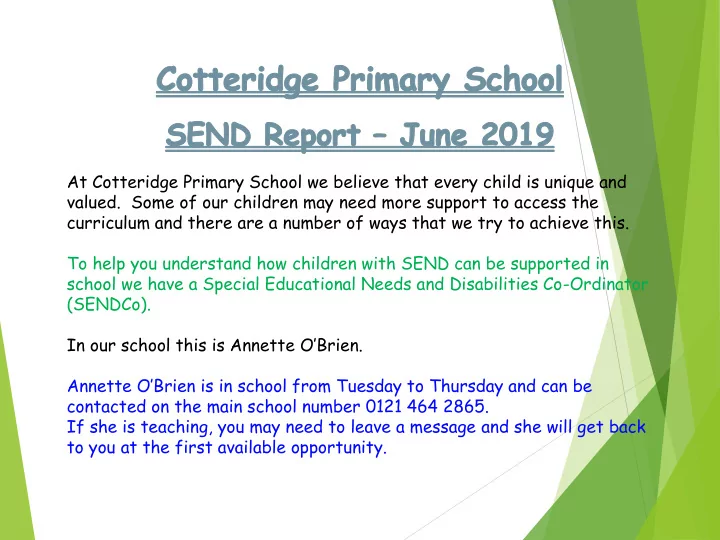

At Cotteridge Primary School we believe that every child is unique and valued. Some of our children may need more support to access the curriculum and there are a number of ways that we try to achieve this. To help you understand how children with SEND can be supported in school we have a Special Educational Needs and Disabilities Co-Ordinator (SENDCo). In our school this is Annette O ’Brien. A nnette O’Brien is in school from Tuesday to Thursday and can be contacted on the main school number 0121 464 2865. If she is teaching, you may need to leave a message and she will get back to you at the first available opportunity.
At Cotteridge School we offer: Open and honest communication • The progress of all children in school is monitored by the class teachers and by School Leaders. • This is reported on at two parents evenings and in an annual written report which is sent home in the summer term. • We have an open door policy and parents are welcome to ask about any aspect of their child’s school life at any time. We ask that this is done either at the end of the day or by booking an appointment with Miss O’Brien. • Children with an identified Special Educational Need or Disability also have personal targets on an Individual Target Plan (ITP) which is reviewed frequently. Parents are invited to discuss this with school staff or the SENDCo at a separate time. • Children who have an Education Health Care Plan (EHCP) will have these reviewed annually. Parents are invited to this and their views and the thoughts of the child form part of the meeting.
Appropriate and effective teaching and learning • We ensure that all children, including those with special educational needs and/or disabilities, receive a broad and balanced curriculum. • Our staff are use a range of teaching strategies which cater for different types of learners and differentiate work to meet our students’ needs. • Children are taught in a range of groups which include whole class teaching, small group work and individual teaching. These groups can vary in content and may include social skills, literacy and numeracy support and lunch clubs, depending on our children’s needs. • We may seek advice from one of our partner agencies (please see next slide) or make referrals to relevant health professionals. • Staff have annual training about students with identified medical needs and Special Educational Needs. There is also on-going intervention training for all staff and regular updates for teaching and support staff. • We follow the Assess, Plan, Do, and Review model and this is applied to all of the provision that we offer.
A Partnership Approach WHO DO WE WORK WITH? WHO CAN THEY SUPPORT? Pupil and School Support Service (PSS) Our students who may need further academic support and assessment. Communication and Autism Team (CAT) Our students with a diagnosis of Autism or who are on the Autism diagnosis pathway. Speech and Language Therapy (SALT) Our students who experience Speech, Language and Communication difficulties. This may be done in school or at an external clinic. Local Authority Educational Psychologist (EP) Our students who need in depth assessment, usually to inform an Education Health Care Plan. Physical Disabilities Team (PDD) Students with physical needs (gross motor) Sensory Support Services Students with impairments with vision and/or hearing. Forward Thinking Birmingham Support, care and treatment for students with social, emotional and mental health concerns. Medical Professionals (GP, Paediatrician, For our students who have or are pursuing a medical Nursing) diagnosis. LAC Looked after children Class Teachers monitor the progress of all children carefully and if, after normal class interventions have been put in place, they have a particular concern about a child’s learning and/or social or emotional wellbeing they will discuss this with the SENDCo . At this stage your child’s class teacher will talk to you about concerns and explain what we are putting in place to address these. We may also ask your permission to liaise with outside agencies at this point.
Information about the Birmingham Local offer can be accessed by the following link: http://birmingham.gov.uk/localoffer Independent advice and support for parents is available from: http://www.birmingham.gov.uk/sendiass Other useful websites for parents of children with SEN : http://www.bdadyslexia.org.uk/ http://www.addiss.co.uk/ British Dyslexia association. ADDISS is a support organisation for parents/carers of children with ADHD, providing information about local groups and advice for parents/carers. http://www.talkingpoint.org.uk/ The talking point website contains information http://www.youngminds.org.uk/ and UK’s leading charity committed to improving resources to help support speech and language the emotional wellbeing and mental health development in young people. It includes of children and young people. email and telephone helplines for advice. http://www.autismwestmidlands.org.uk/ A regional charity providing direct support to people http://www.autism.org.uk/ with autism, and those who care for them. They are National Autistic Society. able to provide support groups, advice and training for parents, and support for siblings. If you would like further information please contact us. Reviewed 06.06.19 in partnership with parents and agencies
Recommend
More recommend